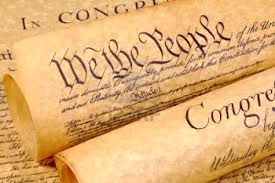If Government Can Take Inalienable Rights How is it Inalienable?

Tags: inalienable rights libertarian philosophy inalienable
If Government Can Take Inalienable Rights How is it Inalienable? published by The 1st Amender
Writer Rating: 5.0000
Posted on 2019-05-24
Writer Description: Loves to blog and debate
This writer has written 211 articles.
The magistrate of United States yore would request unto its people to "...attend church every day, so lest to bring the ire of God and government down upon your stead." For in olden days, it was up to the magistrate to arbitrarily lay rule upon the town or even the colony itself. Behold! Those who seek to avoid going to church that Sunday would indeed face force and ire of the legislative power of the magistrate. To come to the home of the heathen, relinquish their property, and cut the ear off of the very body that seek to threaten God.
Indeed rules that would be considered as irrational were in fact obligatory during the early settlement of the United States. Those that challenge the magistrate, for instance, the Quakers, would seek to keep on their hats when entering in the church on Sunday. The quakers favored to not participate the church to begin with, for they believed to worship in the silence of their home. Nay, behest to the power of the magistrate, would be forced to go to church. Additionally, to remove their hats when entering God's house. Regardless, many Quakers would find their homes and property damaged, often Quakers flogged and run out of town for their constant affection to that of liberty, seen as trends created by heathens.
How then, for with the powers of John Locke, the father of Liberalism, behold the inalienable rights which are not to be infringed under any circumstance? If government can simply revoke them, how are they inalienable? And for that matter; what constitutes an inalienable right?
Under the pretense of John Locke, it is labeled unto the ardent and sacred belief:
- The inalienable right, to never be revoked by those that grant it, to your own body. For what world would you live in where the ruler, chosen or unchosen, have a right to the body of those that live on the land? Even at the highest beholder of power, the President has no right to revoke right to your body, until you yourself revoke the right to the body of another individual could it be justified.
- Being that you have a right to your body, it is safe to assume you have a right to your own labor. To lay ownership of your labor, or to sell your labor to whoever it is you please. For, how could you own your own body without the right to your own labor? In order to maintain the ownership of your own body, it is an absolute pretense to then have the ownership to the work you choose.
- Understanding if you have a right to your own body. This extends into labor, and finally, to property. The inalienable right of ownership of not only hammer but land as well. Through the ownership of your body, it is extended to the fact you have a right to own the property which is required to maintain ownership of your own body. But what if someone is to own the property you lay on? Certainly then, their inalienable rights to property superscede yours. And with enough toil, can lay into your own ownership to property that is NOT to be infringed.
- When the above 3 are met is only when the final doctrine of inalienable right kicks in. Of Liberty. Liberty means to effectively have the ability to do as one pleases. To never be revoked lest you decide to revoke the inalienable rights of another unjustly. Truly only then can liberty be revoked.
These inalienable rights to life, liberty, and property are a radical scheme cooked up by the father of Liberalism. Even today, without the requirement to mention a magistrate, exist many instances of revocation of these fundamental inalienable rights. For what is property taxes, other than a forceful seizure and coersion of property by the power of the state? Imagine for a moment, the owner of hammer must pay a rent to the government every month lest they lose the very hammer they use for their livelihood. This of course, is a vital breach of contract to that of what was intended to the existence of the United States.
Then, when the government comes to destroy your right to your life, liberty, and property that which you own; you therefore have a right to defend it. A right to show those that it is not on their land they infringe. Not on the whim of the magistrate or the tax collector. It is unto the individual to make the rights just that, inalienable. Meaning, if the government would so risk to revoke these rights, the people have never lost them. This is because the people have ownership of their body, and ability to defend themselves in the advent of aggression on their body, and therefore property.
For whatever fact, whim, edict, dictation, governor, statist would point to revoking these inalienable rights is in fact an aggression on your body. Just because the government can "attempt" and very well "succeed" in revoking it, if you are willing to defend your inalienable right with your life, then what exactly can the government revoke?
Sources: self-written
You have the right to stay anonymous in your comments, share at your own discretion.


